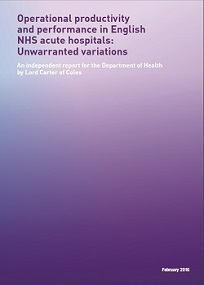News / Administration cuts on Carter agenda

In his final report, published on 5 February, he said corporate and administration costs varied between 6% and 11% of income, with trusts failing to capture the benefits of scale. In one of 15 recommendations in the report, he said trusts should rationalise their corporate and admin functions to 6% of income by 2020 or have plans in place for shared service consolidation with, or outsourcing to, other providers by January 2017.
The report recommendations are designed to tackle the £5bn efficiency opportunity identified in last year’s interim report. While the NHS was the best value healthcare system in the world according to the Commonwealth Fund, the Carter report said more could be done to improve quality and efficiency to deliver the required 2%-3% a year efficiency savings.
The review looked at 32 English non-specialist acute hospitals, which account for around half of the total health budget. It looked across resource areas, including clinical staff, medicines, imaging and back-office functions, finding examples of unwarranted variation. For example, in procurement it found that the average price paid for hip prosthesis varies from £788 to £1590, and trusts buying the most are not paying the lowest price.
Other variations were identified in the report. Unused floor space varied considerably – one trust uses 12% of its floor space for non-clinical activity, while another 69%. Lord Carter recommended trusts’ unused floor space should not exceed 2.5%, and floor space used for non-clinical purposes should not exceed 35%. Paper rostering should end and a new approach should be taken on safe staffing, based on care hours per patient day. Action should be taken on the ‘major problem’ of delayed transfers of care, which could save the NHS £900m a year.
It said £1bn could be saved in procurement overall, together with £1bn from better estate management, £1bn from better management of drugs and £2bn from improved staff management.
The report called for a single integrated performance framework, based around customers, workforce and finances. This would require better use of IT, including real-time monitoring and reporting. NHS Improvement should incentivise the use of existing systems, such as e-rostering, e-prescribing and electronic procurement catalogues. Where necessary some of the additional spending review funding should be made available to invest in digital technologies.
It called for the model hospital concept to be developed further. Lord Carter first introduced the idea of the model hospital ‘to show what good looks like’ in his interim report last year.
The final report includes more detail. It said trusts should use a new metric, the adjusted treatment cost – showing variation for a given output and the potential saving – and weighted activity unit – which compares performance and productivity – alongside measures such as revenue per whole-time equivalent and the purchasing price index.
The metrics could be used to create a model hospital and, together with associated best practice guidance, this would give a single version of the truth.
The report said NHS Improvement should continue to develop the model hospital and its underlying metrics, so that there is one source of data, benchmarks and good practice.
NHS Improvement should also co-ordinate the national clinical programmes to improve quality and efficiency. NHS England, the Department of Health and NHS Improvement should develop strategies to help local NHS bodies tackle delayed transfer of care and remove barriers to collaboration.
Lord Carter will become a non-executive director of NHS Improvement in April, helping the organisation lead the implementation of his recommendations.
The report said trusts generally recognised a third of the savings opportunities the review team put in front of them. They already had plans in place to deliver these efficiencies. Trusts were aware of a further third of the savings, but had no plans to address them as yet. The final third of savings were new to them. National insight and support to help deliver the savings were necessary and a ‘heavy responsibility’ had been placed on NHS Improvement to manage the delivery of the savings. However, all national bodies must work together and trust boards should be held to account for delivery of the efficiencies.
Lord Carter said: ‘My experience of the NHS and hospitals internationally is that high quality patient care and sound financial management go hand in hand. To improve the quality of care hospitals must grasp resources more effectively, especially staff, which account for more than 60 pence of every pound hospitals spend.
‘Giving hospitals the tools and support to better manage resources will make it easier for boards to follow the example of the best trusts and mean every patient can receive the same world class care and taxpayers will also receive a fairer return on their significant investment in the NHS.’
NHS Confederation chief executive Rob Webster welcomed the report, but added that the potential £5bn of savings identified would provide less than a quarter of the required efficiencies.
‘As we implement the recommendations, there must continue to be close engagement with the sector and a genuine understanding of the challenge NHS leaders are facing locally. The capacity to improve services and reduce management costs will be challenging. A cap on management costs, which have seen dramatic reductions in recent years, must not be a false economy,’ he added.
Related content
The Institute’s annual costing conference provides the NHS with the latest developments and guidance in NHS costing.
The value masterclass shares examples of organisations and systems that have pursued a value-driven approach and the results they have achieved.